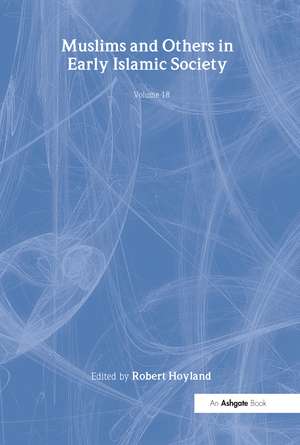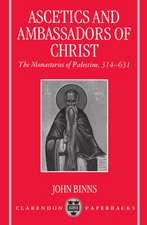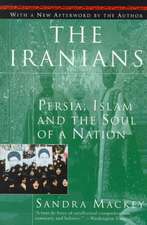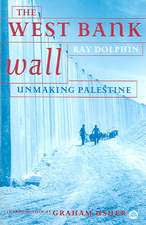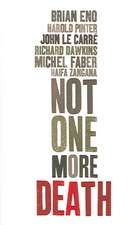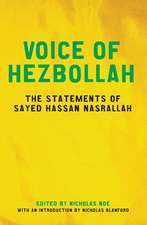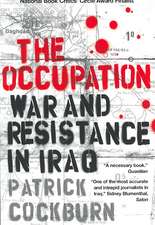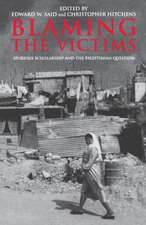Muslims and Others in Early Islamic Society: The Formation of the Classical Islamic World
Editat de Robert Hoylanden Limba Engleză Hardback – 28 iul 2004
Din seria The Formation of the Classical Islamic World
- 24%
 Preț: 330.57 lei
Preț: 330.57 lei - 29%
 Preț: 1246.12 lei
Preț: 1246.12 lei - 9%
 Preț: 1659.97 lei
Preț: 1659.97 lei - 28%
 Preț: 1585.56 lei
Preț: 1585.56 lei - 27%
 Preț: 1216.18 lei
Preț: 1216.18 lei - 25%
 Preț: 1249.21 lei
Preț: 1249.21 lei - 29%
 Preț: 1022.09 lei
Preț: 1022.09 lei - 28%
 Preț: 1473.15 lei
Preț: 1473.15 lei - 29%
 Preț: 1300.76 lei
Preț: 1300.76 lei - 28%
 Preț: 1418.71 lei
Preț: 1418.71 lei - 29%
 Preț: 1249.37 lei
Preț: 1249.37 lei - 27%
 Preț: 1051.46 lei
Preț: 1051.46 lei - 29%
 Preț: 1162.81 lei
Preț: 1162.81 lei - 25%
 Preț: 688.22 lei
Preț: 688.22 lei - 29%
 Preț: 1161.17 lei
Preț: 1161.17 lei - 28%
 Preț: 1417.98 lei
Preț: 1417.98 lei - 26%
 Preț: 1014.74 lei
Preț: 1014.74 lei - 21%
 Preț: 338.37 lei
Preț: 338.37 lei - 29%
 Preț: 1410.83 lei
Preț: 1410.83 lei - 28%
 Preț: 1383.76 lei
Preț: 1383.76 lei - 27%
 Preț: 1499.60 lei
Preț: 1499.60 lei
Preț: 1059.63 lei
Preț vechi: 1451.94 lei
-27% Nou
Puncte Express: 1589
Preț estimativ în valută:
202.79€ • 210.93$ • 167.41£
202.79€ • 210.93$ • 167.41£
Carte tipărită la comandă
Livrare economică 15-29 aprilie
Preluare comenzi: 021 569.72.76
Specificații
ISBN-13: 9780860787136
ISBN-10: 0860787133
Pagini: 398
Dimensiuni: 178 x 254 x 25 mm
Greutate: 1.4 kg
Ediția:1
Editura: Taylor & Francis
Colecția Routledge
Seria The Formation of the Classical Islamic World
Locul publicării:Oxford, United Kingdom
ISBN-10: 0860787133
Pagini: 398
Dimensiuni: 178 x 254 x 25 mm
Greutate: 1.4 kg
Ediția:1
Editura: Taylor & Francis
Colecția Routledge
Seria The Formation of the Classical Islamic World
Locul publicării:Oxford, United Kingdom
Cuprins
Contents: Introduction; Religious communities in late Sasanian and early Muslim Iraq, Michael G. Morony; Dhimmah in Qur’an and Hadith, Mahmoud Ayoub; The legislative autonomy of Christians in the Islamic world, Néophyte Edelby; How Dhimmis were judged in the Islamic world, Antoine Fattal; Problems of differentiation between Muslims and non-Muslims: re-reading the 'Ordinances of 'Umar' (Al-Shurut al-’umariyya), Albrecht Noth; 'Do not assimilate yourselves...' La tashabbahu..., M.J. Kister; Minority selfrule and government control in Islam, S.D. Goitein; Comparative religion in the apologetics of the first Christian Arabic theologians, Sidney H. Griffith; Jewish polemics against Islam and Christianity in the light of Judaeo-Arabic texts, Sarah Stroumsa; Muslim studies of other religions: the medieval period, Jacques Waardenburg; Christian polemic and the formation of Islamic dogma, C.H. Becker; Socio-economic history and Islamic studies: problems of bias in the adaptation of the indigenous population to Islam, Claude Cahen; Mawlas: freed slaves and converts in early Islam, Daniel Pipes; Conversion in early Islamic Egypt: the economic factor, Gladys Frantz-Murphy; Questions concerning the Mazdaeans of Muslim Iran, Jean de Menasce; General index.
Notă biografică
Robert Hoyland is Professor of Islamic History at the University of Oxford, UK.
Descriere
Muslims and Others in Early Islamic Society concerns the interaction between Muslims and the other religious denominations of the Middle East in the period 620-1020. This is arguably the single most important issue in the history of the early Islamic Middle East, since the Muslims were initially a minority in the lands that they had conquered and so had to reach some modus vivendi with the various religious communities in their realm. Fifteen articles by leading scholars shed light on this process from a number of different perspectives: historical, conceptual, legal, social and theological. An introduction both gives an overview and examines possibilities for future research. The period under study is demarcated at one end by the Prophet Muhammed (d. 632) who, as the Qur’an tells us, had to deal with Jews, Christians and polytheists. At the other end lies the great legal/political thinker Manardi (d. ca. 1020), by whose time the Middle East had become substantially Islamicised.
